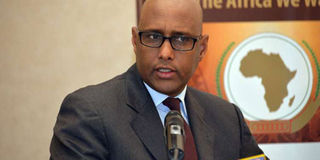Kenyan traders to benefit from expanded free market

Cabinet Secretary for Industrialisation Adan Mohammed during a past function. PHOTO | SALATON NJAU | NATION MEDIA GROUP
What you need to know:
- The Tripartite Free Trade Area (TFTA) agreement which includes 26 countries is aimed at enhancing connectivity, reduction of costs of doing business, as well as addressing productive capacity constraints through its three pillars: industrial and industrial development, and market integration pillars.
- Speaking during the fourth meeting of the Tripartite Council of Ministers in Nairobi, Industrialisation Cabinet Secretary Adan Mohamed said that the agreement will enhance intra-regional trade which at the moment stands at about 13 per cent; attract more investment and boost production and competitiveness.
Kenyan business community will soon benefit from an expanded free trade market area after the operationalisation of a tripartite agreement set for next year.
The Tripartite Free Trade Area (TFTA) agreement which includes 26 countries is aimed at enhancing connectivity, reduction of costs of doing business, as well as addressing productive capacity constraints through its three pillars: industrial and industrial development, and market integration pillars.
Speaking during the fourth meeting of the Tripartite Council of Ministers in Nairobi, Industrialisation Cabinet Secretary Adan Mohamed said that the agreement will enhance intra-regional trade which at the moment stands at about 13 per cent; attract more investment and boost production and competitiveness.
The CS said that the agreement’s industrial pillar is aimed at promoting value addition to export products and reducing reliance on primary product while the infrastructure development pillar is critical in the integration process as it provides the means to producing and moving trade products to the market.
“At the moment transport infrastructure in Africa is a challenge. Without adequate infrastructure, doing business in Africa will remain a challenge. At times it is cheaper to import a car from Japan to Gabon, or DRC than a similar car made from Kenya. It is therefore critical that these pillars do not lag behind,” he said.
Dr Mohamed also said that the member states have made significant progress on rules of origin and will provide an interim arrangement to determine origin and confer the necessary preferential treatment on goods originating from the tripartite partner states as soon as the agreement comes into force.
He, however, added that negotiations are still ongoing regarding tariff offers but there is high level of commitment by the members to complete the negotiations.
“At the stage now reached, dedicated efforts must be placed on the finalisation of exchange of offers, signing and ratification of the agreement in order to ensure a comprehensive, fully functional and beneficial trade regime,” he said.
TFTA was launched in Sharm El Sheik, Egypt in June 2015 with the main objective being the integration of the African Continent into one market economic bloc with a single economic space.
The Tripartite Council consists of 26 countries drawn from East Africa Community (EAC), Common Market for Eastern and Southern Africa (Comesa) and Southern African Development Community (SADC) with a combined population of 625 million people and an aggregate Gross Domestic Product (GDP) of US$1.2 trillion, which constitutes more than half the population of Africa and over 58 per cent of the continent’s economic activity.
So far six annexes on Non-Tariff barriers which define the scope and elements of cooperation have been finalised and legally agreed on in addition to the framework for cooperation and work programme on industrial development.
The six annexes include: trade facilitation, customs cooperation and mutual administrative assistance, transit trade and facilitation, technical barriers to trade and sanitary and phyto-sanitary measures.
The next tripartite summit will be held in July next year in Kigali, Rwanda and will be chaired by the new Task Force chair, EAC Secretary General Ambassador Liberat Mfumukeko who takes over from Dr Stergomena Lawrence Tax, SADC Executive Secretary.





